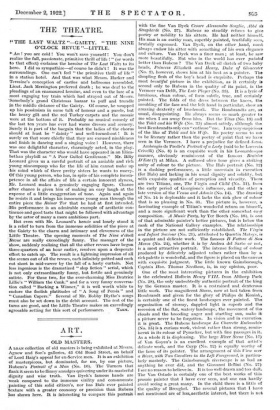THE THEATRE.
f' THE LAST WALTZ "—GAIETY. "THE NINE O'CLOCK REVUE "—LITTLE.
"An! you are cold ! You won't save yourself You don't realize the full, passionate, primitive thrill of life ! " (or words to that effect) exclaims the heroine of The Last Waltz to its hero. I did so sympathize—of course he didn't It was the surroundings. One can't feel "the primitive thrill of life" In a station hotel. And that was what Messrs. Harker and Terraine's conception of castles and ballrooms resembled. Lieut. Jack Merrington preferred death ; he was deaf to the pleadings of an enamoured heroine, and even to the lure of a most engaging toy train which had strayed out of Messrs. 'Somebody's grand Christmas bazaar to puff and trundle in the middle distance of the Gaiety. Of course, he wrapped up his pessimism in some talk of honour and a parole, but the heavy gilt and the red Turkey carpets and the mosaic were at the bottom of it. Probably no musical comedy of the last ten years has ever had worse dresses and scenery. Surely it is part of the bargain that the ladies of the chorus should at least be " dainty " and well-turned-out ! It is surely on that score chiefly that they are excused nimbleness and _finish in dancing and a singing voice However, there was one delightful character, charmingly acted, in the play. That was the character who would have appeared in an Eliza- bethan playbill as "A Poor Gulled Gentleman." Mr. Billy
• Leonard gives us a careful portrait of an amiable and rich young nincompoop who for the life of him cannot make up this mind which of three pretty sisters he wants to marry. Of this young person, who has, in spite of his complete incom- petence in all the affairs of life a certain innocent slyness, Mr. Leonard makes a genuinely engaging figure. Chance after chance is given him of making an easy laugh at the expense of a little exaggeration of tone. Again and again • he resists it and brings his innocuous young man through the entire piece the Reiner Tor that he had at first intended. ,His performance is an admirable example of aesthetic con- tinence and good taste that might be followed with advantage by the actor of many a more ambitious part.
But even with Mr. Leonard's heroic and lonely stand it is a relief to turn from the immense solidities of the piece at the Gaiety to the charm and intimacy and cleverness of the Little Theatre. The opening moments of The Nine o'clock .Revue are really exceedingly funny. The manager of the Show, suddenly rearming that all the other revues have begun .three-quarters of an hour earlier, resolves upon a desperate effort to catch up. The result is a lightning impression of all the scenes out of all the revues, each infinitely potted and each cut short in mid-career by the fall of a hasty curtain. Not less ingenious is the dramatized "slop fiction" serial, which is not only extraordinarily funny, but fertile and genuinely satiric. For these two, for the ever-charming Miss Beatrice Lillie's "William the Conk," and for a very funny conversa- tion called "Backing a Winner," it is well worth while to endure the foolish platitudes of "A Song of Persia" and "Canadian Capers." Several of Mr. Bobby Blythe's songs must also be set down in the debit account. The rest of the turns are good, and the Little Theatre makes an exceedingly
agreeable setting for this sort of performance. TAUN.






































































 Previous page
Previous page